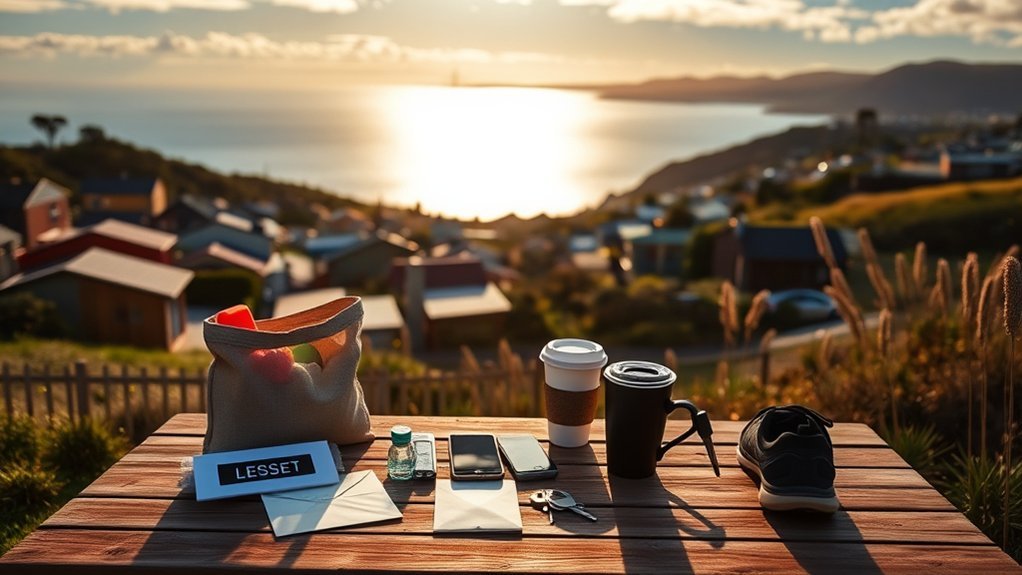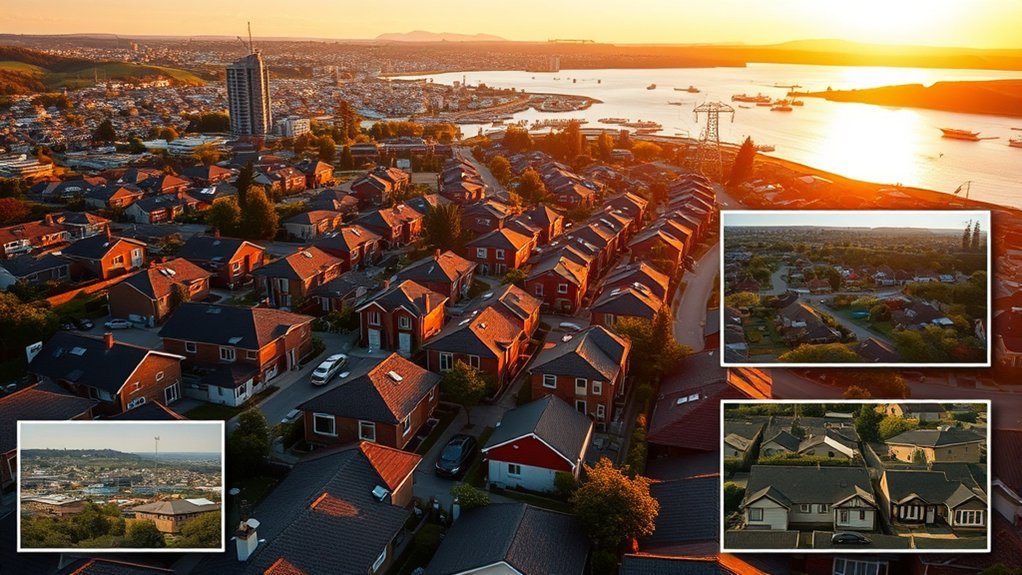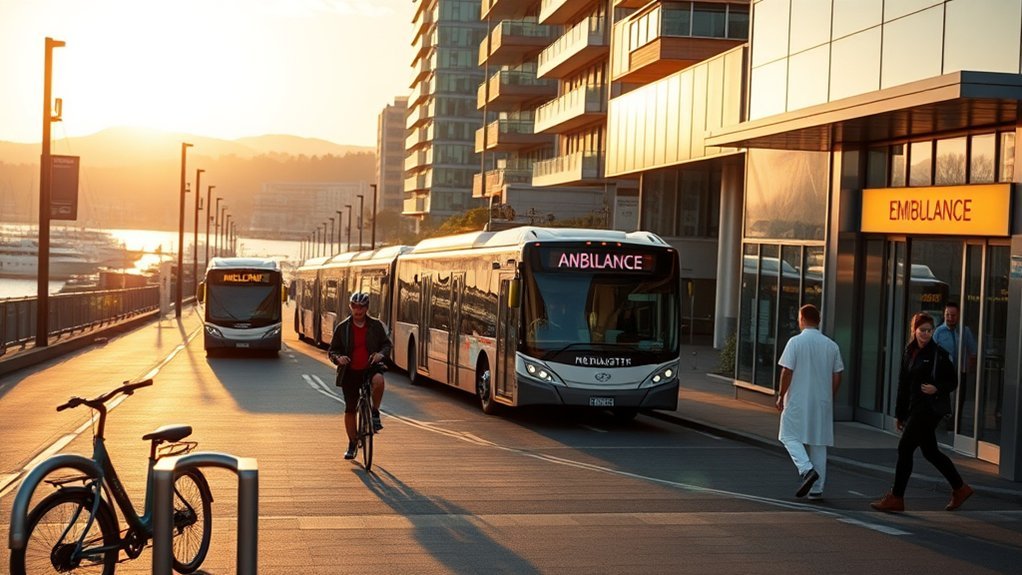You’ll typically need NZD 2,950–3,600 a month for non‑rent expenses, plus NZD 650–3,500 for rent depending on city and size, so expect big variation by location. Urban centers like Auckland and Wellington push costs higher, while places like Palmerston North are cheaper. Groceries, transport and utilities form most spending; taxes and GST add to purchases. Use these ranges to set a realistic budget, and keep going to see detailed breakdowns and saving strategies.
Average Monthly Living Costs and Budgeting

If you’re budgeting for life in New Zealand, expect monthly non-rent expenses of about USD $1,830–$2,240 for a single person and USD $2,950–$3,600 for a family of four; add typical rent of roughly USD $1,040–$1,450 for a one‑bed in major cities or USD $2,150–$2,650 for a three‑bed.
You’ll use these average monthly expenses to gauge total cost of living against local salaries. For a single person, rent for a one-bedroom plus non-rent costs often consumes a large share of income; families face proportionally higher monthly living expenses.
Budgeting should allocate roughly 30% of non-rent spending to groceries and entertainment, while housing costs remain the biggest variable. As an expat, you can lower net costs by shopping at local markets, using public transportation, or flat-sharing to split housing costs.
Compare city job offers to the average net salary to determine affordability, and adjust your monthly budget projections for utilities and discretionary spending accordingly.
Housing and Utility Prices Across Cities

While housing costs vary widely across New Zealand, urban centers like Auckland and Wellington command the highest rents—Auckland one‑bedrooms typically run NZD $1,040–$3,500 (USD $650–$2,100) and Wellington NZD $780–$2,150 (USD $490–$1,350)—whereas Christchurch and smaller cities such as Palmerston North offer cheaper options (Christchurch from about NZD $860/ USD $540 and Palmerston North around NZD $650/ USD $410).
You’ll find rental prices reflect demand: Auckland and Wellington push averages up, Christchurch sits mid‑range, and Palmerston North represents affordable housing for budget-conscious movers.
Utility costs typically add NZD $200–$300 (USD $120–$180) monthly, so factor utilities into your monthly expenses and overall cost of living comparisons.
Expect utilities to add about NZD $200–$300 (USD $120–$180) monthly—factor this into your budget.
Use this data-driven snapshot to compare net monthly outlays across cities and prioritize location versus price.
Consider trade-offs: proximity to jobs in Auckland/Wellington versus lower rent in Christchurch or Palmerston North, where you’ll keep monthly expenses down while accepting longer commutes or fewer urban amenities.
- Compare city rent ranges.
- Add NZD $200–$300 for utilities.
- Evaluate cost of living trade-offs.
- Prioritize affordable housing vs location.
Food, Groceries and Dining Out Costs

Because groceries typically make up about a third of your monthly budget, it helps to compare unit prices: chicken fillets run around NZD $4 per pound and a dozen eggs cost NZD $3.80–$4.64.
Cooking at home (about NZD $20–$40 per person per meal) is far cheaper than dining out, where a three‑course dinner for two at a mid-range restaurant sits at NZD $66–$82 and lunches cost NZD $14–$17.
You’ll manage food prices by choosing where you shop: supermarkets like Pak’nSave are budget-friendly, while Countdown and New World carry wider ranges at higher cost.
For grocery shopping, prioritize staples and seasonal fresh produce to reduce per-meal cost during meal preparation.
Dining out is convenient but raises weekly spending quickly; limit mid-range restaurant visits if you’re saving.
Local farmers’ markets often supply competitively priced fruit and vegetables and can lower grocery bills.
Track unit costs, compare supermarket promotions, and plan menus to keep overall food spending predictable and efficient.
Transportation and Healthcare Expenses

Although public transport can keep your daily travel costs low, owning a car raises both regular and fixed expenses: single fares start around NZD $2.50 and monthly passes average NZD $150, whereas petrol runs about NZD $3 per liter and annual vehicle registration adds roughly NZD $500.
You’ll compare transportation costs in New Zealand by weighing public transport fares and monthly passes against petrol prices and registration.
Healthcare costs in New Zealand mix a largely free public healthcare system for residents with out-of-pocket fees for many visitors and faster private care. GP visits for expats run NZD $75–$120; specialist private consultations NZD $150–$300.
Private health insurance costs NZD $1,200–$5,000 annually if you want quicker access. The Accident Compensation Corporation covers accident-related treatment for residents and tourists, reducing unexpected medical bills.
Balance these items when budgeting living expenses: reliable transport, fuel and registration, routine GP care, and potential private insurance for faster specialist access.
- Compare public transport fares vs driving costs
- Factor monthly passes and petrol prices
- Include GP visits and specialist fees
- Consider ACC and private health insurance
Salaries, Taxes and Financial Planning

When you evaluate salaries in New Zealand, remember that average net pay typically falls between NZD $60,613 and $77,194 annually (about USD $35,987–$46,651), but your take-home will vary markedly by industry, experience and tax bracket; income tax is progressive from 10.5% to 39% and a 15% GST applies to most purchases, so plan budgets and savings around those effective rates.
You should compare salaries across sectors and locations: urban roles often pay more but face higher rent and daily expenses, affecting real purchasing power. Confirm your tax residency status early to access correct income tax rates and entitlements.
Include Goods and Services Tax on routine spending forecasts. For a family of four expect monthly basic costs (excluding rent) around NZD $2,950–$3,600—factor that into net salary calculations.
Use budgeting tools to model scenarios, track expenses, and set savings targets. Effective financial planning ties realistic salary expectations to cost of living, taxes, and disciplined budgeting.
Frequently Asked Questions
Is It Cheaper to Live in NZ or the US?
It’s cheaper to live in NZ overall: you’ll typically pay about 20% less than in the US, with lower rents, slightly cheaper dining and transport, and monthly single-person expenses roughly USD $1,830–$2,240 versus higher US averages.
How Much Money Do You Need to Live Comfortably in New Zealand?
By coincidence, you’ll need roughly USD $1,830–2,240 monthly (excluding rent) as a single and about USD $2,950–3,600 for a family of four; add USD $1,190–2,650 for typical city rent depending on size.
Can a US Citizen Live in New Zealand?
Yes — you can live in New Zealand if you obtain a valid work visa or residency. You’ll typically need a job offer, in-demand skills, or family ties; income, benefits, and healthcare access compare favorably to many US regions.
Is It Expensive to Live in New Zealand?
It’s moderately expensive: you’ll pay about $1,830–$2,240 monthly (excluding rent) for a single, rent adds $1,190–$1,450 in major cities, yet overall costs are roughly 20% lower than the U.S. on average.
Conclusion
You’ll find living costs in New Zealand vary widely by city: Auckland rents are about 30% higher than smaller centers, so choosing location matters. On average, plan for NZ$2,500–3,500 monthly for a comfortable single lifestyle; housing often makes up roughly half that. That 30% rent gap highlights how much you can save by living outside major metros, so compare cities, factor utilities and transport, and align your budget with local salary levels.


